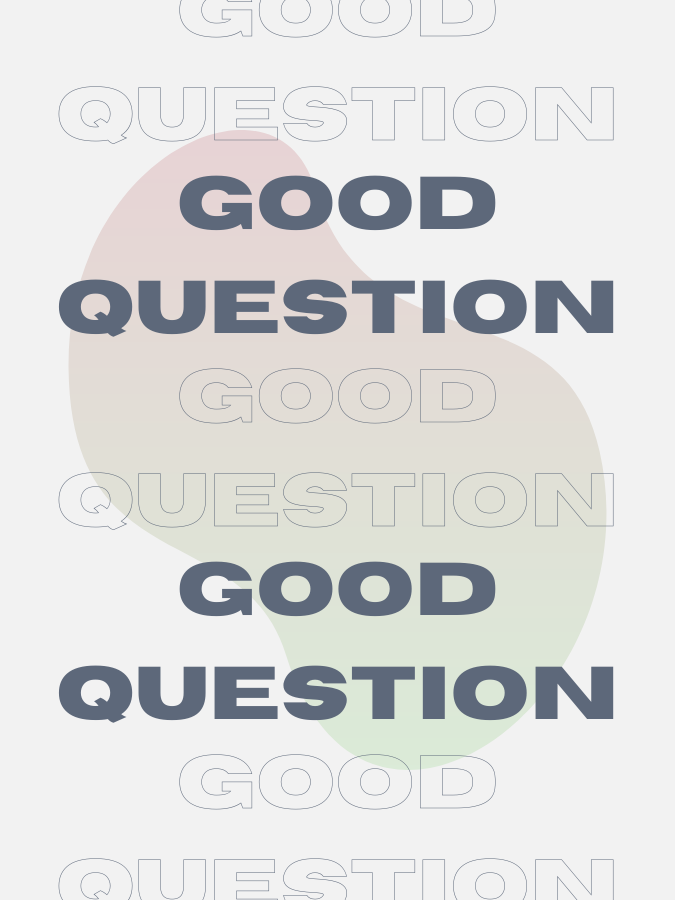
Should I date someone who isn’t of my faith?
Welcome to our advice column where our editors offer thoughtful answers to your pressing inquiries. Head here to submit an anonymous question, and follow here for new Good Questions.✨
I’ve recently connected to my faith more, and although I’m so content and know it’s better for my life, I’m wondering what dating will look like now. Should I date someone who isn’t of my faith? How do I explain my comfort with certain dating things due to my beliefs?
Thank you for your thoughtful question, as I’m sure it’s a popular one for many people. I’m glad that you have found such a deep connection to your faith, and I can definitely understand how it may play a large role in your dating life.
Your question reminds me of the age-old dating advice that instructs us to consider the traits we value most in a future partner. Generally, we all want someone honest, kind, loyal, and trustworthy. I point this out because, ultimately, what’s most important to you will likely be your values and whatever else you deem non-negotiable.
“Instead, ask yourself, ‘What are my non-negotiables?’ Take a moment to write them down and any associated values that come to mind.”
Rather than asking, “Should I date someone who isn’t of my faith?” try reframing the question. Instead, ask yourself, “What are my non-negotiables?”
Take a moment to write these down and any associated values that come to mind (because, in so many religions and backgrounds, many values are the same—they are just described differently). Is it vital that your partner attends religious services or celebrates specific holidays with you? Is raising a future family with your religion important, or are you open to a life of mixed faiths and beliefs? Figuring out these non-negotiables first will save you lots of time and energy.
When you do begin dating and/or are exploring a longer-term commitment, consider setting aside time early on to discuss any needs extending from your beliefs. For example, I grew up as a vegetarian due to my family’s religion, but my fiancé eats meat. Many of his family’s important cultural moments are centered around meat. When we first began dating, it was easier because the meat wasn’t inside my home as we were only eating together on dates. But once we moved in together, we had to have a longer conversation about navigating our dietary differences.
“When you do begin a longer-term commitment, consider setting aside time early on to discuss any needs extending from your beliefs.”
Today, my fiancé and I have the shared understanding that I will not touch or handle meat and he will do his best to minimize cooking it around me. In addition, he is a vegetarian two days a week to better understand my experience (his prerogative, which I appreciate). We’ve also decided that, should we have children, they’ll be raised without meat until they’re old enough to make that decision for themselves. So, while my story isn’t the same as having different faiths, it is centered around my non-negotiables and learning how to navigate these with a partner.
“A strong relationship is centered around compromise. While you will have your non-negotiables, your partner will inevitably have theirs.”
If there’s anything I’ve learned in my six-year (and counting) relationship, it’s that a strong relationship is centered around compromise. While you will have your non-negotiables, your partner will inevitably have theirs, and the outcome should be jointly decided. It wasn’t ideal for me to have meat in my house, but I also love my partner and didn’t think it’d be fair to ban it outright. So we found a middle ground we could both accept and work around. This may be possible with differing faiths, too, as long as you and your partner are willing to compromise. Of course, if they (or you) believe that any one faith is better or “more important” than another, then that should absolutely be a discussion point early on.
Another point, which I recently reflected on with a friend because we’re both dating “outside” our family’s religions, is that the world may think that what you’re doing is “wrong,” especially if it’s not the norm to date outside one’s faith. Ultimately, it will be up to you to decide what’s best, perhaps despite any external judgment that someone may have. I’m sure it was a shock for some in my community to see me with a non-Jain, non-Indian man, but it was more important for me to build a life with my partner than to throw away a meaningful relationship because of what others thought.
“It was more important for me to build a life with my partner than to throw [it] away because of what others thought.”
At the end of the day, if your partner truly loves and cares for you, then they’ll likely accept and respect your decisions as they relate to faith and vice versa. Whether it’s abstinence, holding off on moving in together, dietary lifestyles, or any other relationship aspect, you should never be put in a compromising position where your values and life decisions are at odds. Hopefully, they’ll be committed to supporting you and your relationship, whatever you’ve both decided it to be.
Read more Good Questions here.
Have something on your mind? Click the button below 👇 ✨
RELATED READING
Henah Velez (she/her) is a Staff Writer at The Good Trade. In addition to her work here, Henah is the Development and Communications Manager at She’s the First, a nonprofit fighting for a world where every girl chooses her own future. Based out of New York City, you can usually find Henah roaming around Jersey City’s small businesses, hanging with her pets, or traveling as much as possible.

